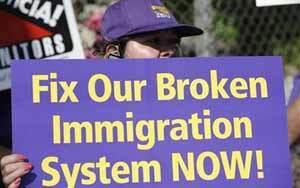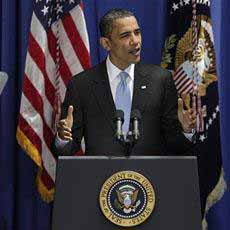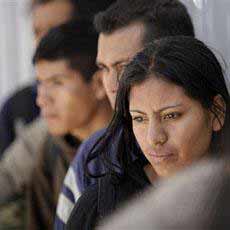|
 A demonstrator protests Arizona's immigration law in Los Angeles before the start of a Los Angeles Dodgers' baseball game with the Arizona Diamondbacks in May. Some people have called for a boycott of Arizona products because of the law. |
One of Barack Obama's campaign promises was to reform immigration policies. On Thursday he gave his first major speech on the issue as president.
BARACK OBAMA: "In sum, the system is broken. And everybody knows it."
One reason for the speech was the state of Arizona's recent passage of its own law against illegal immigration. That law has led to protests around the country. However, in public opinion surveys a majority of Americans support it. Mr. Obama criticized the law, but said such laws are the understandable result of inaction at the federal level.
After his speech, religious leaders demonstrated to call for Congress to act this year. Rabbi Michael Feingold works with immigrant and low-wage workers in New York.
MICHAEL FEINGOLD: "The way the system is now works for no one. It doesn't work for the immigrants themselves, it doesn't work for the government and it doesn't even work for some employers."
The president said reform must be comprehensive, dealing not just with future immigrants but also those here now. An estimated 11 million are undocumented.
BARACK OBAMA: "They must be required to admit that they broke the law. They should be required to register, pay their taxes, pay a fine and learn English. They must get right with the law before they can get in line and earn their citizenship."
|
 President Obama speaking on immigration at American University in Washington. |
In Arizona, officers are now being trained in the new law set to take effect July 29th. It requires police to confirm the immigration status of a person they meet during a lawful stop. That is only if the police have "reasonable suspicion" that the person is in the country illegally.
The law bars police from detaining anyone based on ethnic or racial appearance. But Hispanics and others say it could still lead to racial profiling. They say people, including legal residents and American citizens, could be unfairly targeted. Police say one thing that makes discussion of this law difficult is that many critics have not read the law.
Tucson police Sergeant Fabian Pacheco also notes that 40 percent of officers in his city are Hispanic. Still, he says he worries that more people will avoid cooperating with the police, and that officers will have less time to fight more serious crimes.
Some also worry that officers could be sued under the law by people who accuse them of not doing enough enforcement. At the same time, civil rights activists could accuse them of being too aggressive.
|
 A woman waits for officials in Nogales, Mexico, after being expelled from the United States. |
Arizona has become the point of entry for more than 40 percent of illegal entrants from Mexico. The numbers grew after the federal government increased border controls in California and Texas.
Some Arizona officials blame smugglers for a serious problem with kidnappings in the Phoenix area. Drug groups control much of the human smuggling. Some border crossers are victims of violence. Others die crossing the desert. An Arizona rancher was also killed this year -- probably, officials say, by a Mexican drug smuggler.
And that's IN THE NEWS in VOA Special English. I'm Steve Ember.
profiling: the act of collecting useful information about somebody/something so that you can give a description of them (有关人或事物的)资料搜集
New Immigration Rules 英国移民新政提高英语门槛
Ethiopian Jews push Israel on immigration right
Immigration to Europe drops, in global economic downturn
Italy to step up fight against illegal immigration
(来源:VOA 编辑:陈丹妮)
